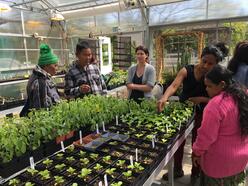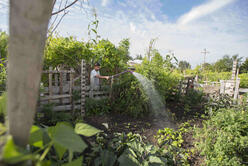The IRC in Seattle's New Roots Program is a food access and community wellness program serving refugee and immigrant communities in South King County. The program works with families and individuals helping them to adjust to their new home through community gardening, nutrition classes, senior activities, food system orientations, and youth food justice internships. The program also facilitates wellness programs for people struggling with social and emotional isolation.
This spring, the program will see an expansion into the Kent Valley in partnership with the Food Access and Aggregation Community Team (FAACT). FAACT is a collaboration between the South King County Food Coalition, Elk Run Farm, the Food Innovation Network, Highline College, Living Well Kent, Shared Soil, and the IRC. Together, these organizations will help foster equitable, local food economies across King County by providing farmland and aggregation infrastructure for small scale commercial farmers who have faced barriers to access.

This partnership has been over two years in the making, and will address the local need for improved health equity, food access, and community development opportunities for the vibrant and innovative farmers and businesses in South King County. With this collaboration and shared land, farmers will have a place to grow, aggregate, and market their crops - while working together to build momentum around food justice, sustainable farming, and community collaboration.
The FAACT collective stewards five acres of rich farmland for local farmers to begin working on this summer. A handful of graduates from IRC's Micro-Producer Academy (MPA) and Farm Business programs plan to participate in growing commercially, and plan to start their operations on two acres of that land in 2021. The IRC's MPA and Farm Business programs work in partnership with talented refugee and immigrant farmers to share comprehensive trainings, technical assistance, and business development opportunities- and have former participants currently operating small scale farming operations!

Deepa, the New Roots Sr. Program Coordinator at IRC noted how big the regional impact of this land will have. Farmers from all backgrounds who have experienced barriers to entry will be working as a collective on the land. "It's been a very collaborative process" says Deepa, when considering the vast number of partners they've worked with. Public health organizations, county offices, local non-profits, the Department of Natural Resources, experts and consultants, universities, and local refugee and immigrant farmers have all been involved in building out the vision for the property and project. While the county currently calls the property "Horseneck Farm", FAACT plans to work with farmers to come up with a name that speaks to the group who will be taking care of the land.
IRC staff will work with our program participants, but will also offer support to all farmers on the land. Sharing collective knowledge, expertise, infrastructure, and resources will benefit the collective - and have a greater impact regionally. There is still learning to be done for experienced farmers and program leads, of course - the property is on a floodplain, which will require learning and adjusting to the new ecosystem.
While this new partnership will offer significant land to small scale commercial farmers, the New Roots team is also working on a seperate indoor agriculture initiative - which offers opportunity for farmers to grow food year round and supplement their outdoor farming. Indoor agricultuer also can help develop a variety of skills needed to farm via hydroponic towers, such as learning how to code. The collaborative nature of the New Roots partnership will offer regional impact and benefit - sharing fantastic farmland with small growers who have high barriers to entry, building space for shared learning and support for farmers, and ultimately creating more holistic food systems to the South King County region.